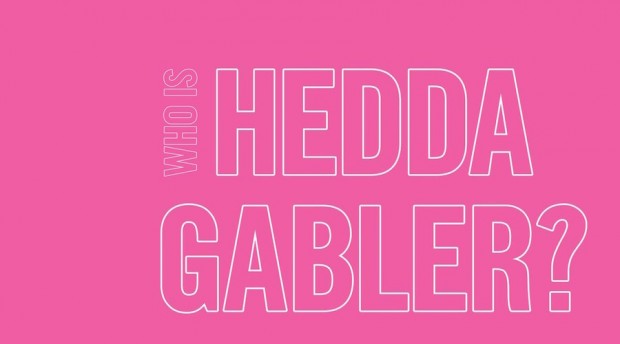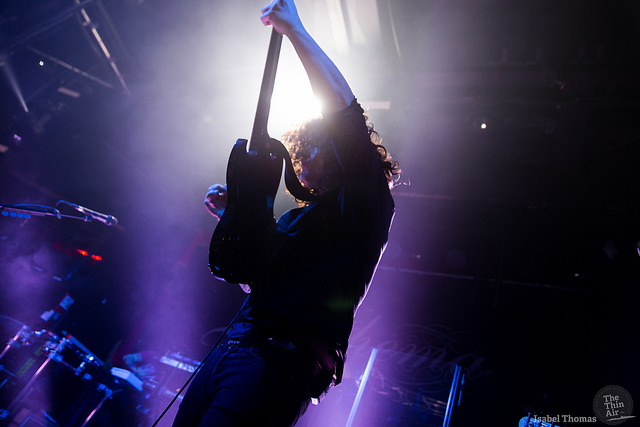Retelling the story of a woman plagued by unrest and uncertainty, Mark O’Rowe’s adaptation of Ibsen’s Hedda Gabler offers an initial presentation of cold austerity. At first glance, from foreboding show poster to spacious set, the makings of stark drama are at hand. However, the uncertainty which tinges the fabric of Ibsen’s anti-heroine ultimately seeps into every aspect of production in the Abbey Theatre’s latest venture, leaving the piece feeling directionless and its audience unguided.
On entering the space, the set, designed and dressed by Paul Mahony and Liz Barker respectively, paints an impressionistic portrait dominated by striking visual perspective. Underscored by a luminescent floor, back wall, and Barker’s bare-essential furnishings, the stage invites an open canvas waiting to be animated to the max. The proscenium itself is extended by two feet to emphasise the set’s wide-angular dimension. And yet the design’s potential for lively movement is left untapped by static staging, rendering a set and text which don’t speak to each other’s capabilities. The narrative entirely transpires over a full 24 hours in the same living room of newly weds Hedda and Jorge Tesman, whom she stiffly calls by last name only, and so the appeal to unpack the drama primarily through dialogue is understandable. Yet director Annabelle Comyn shares a staging credit with movement-director Sue Mythen, a production choice which ultimately baffles considering just how little it actually moves. Between these two ladies of the Lir and the cast itself, O’Rowe’s re-adapted characters cautiously locate transition lines where they move camp from one stage corner to the next to convey plot sequence. Given the staccato nature of O’Rowe’s pen, these simplistic choices could read well with a more rounded development of dialogue. Yet between the slow gait of character interaction and a plethora of lengthy pauses, the text lags.
As a whole, the show feels unsure, and this feeling encapsulates a variety of show factors. Ambiguous accents hailing from all corners of the Isles lend a linguistic hodgepodge to an already out-of-sync cast. Clunky, drawn-out scene transitions, featuring static video projections and white-noise sound clips by a.v.-designer Hugh O’Conor seem to parallel no actual feature of scenic development. In short, the play is simply uncertain of itself. An unfortunate result of this uncertainty is that the drama’s stakes are rarely raised. Ibsen’s story depicts a Hedda so unhappy with the prospects of married womanhood that she focuses her wit and alluring charm on toying with the people around her to disastrous ends. Jealous of lives she sees as worth living, Hedda builds a calculating visage capable of any malice. Only come story’s end, when the mask is snatched away and her hand behind the wicked machinations is revealed, do both cast and audience witness Hedda’s spectacular swan-dive and the crumble of her house of cards. Given the slow roll of this production’s ups and downs, however, that climax is never earned. Catherine Walker, instead, captures a Hedda who is altogether too fragile throughout the show, a quality hammered home through recycled intonation and posture, making the audience unconvinced as to the lady’s conniving nature. Walker’s Vivien-Leigh-esque portrayal does entice, at first, but it doesn’t serve the big-picture needs of a role which rivals Lady Macbeth. We don’t invest in the sheer danger of Hedda’s games, so we don’t feel the stakes when other characters finally notice. The rest of the cast plays doubtful as to how to respond to each other, as well, and though they tell us of their status and troubles through O’Rowe’s words, trepidation permeates how they wear their circumstances.
Ibsen has been thoughtfully reworked by Abbey hands before and will likely find his way to the footlights of Ireland’s national theatre in the future. Perhaps even Mark O’Rowe will lend his poignant language to the next adaptation, given his track of success and strong relationship with the Abbey and Irish theatre. A wealth of talent is clearly at hand in this production and will likely serve the Abbey for years to come. What Hedda Gabler seems to lack, unfortunately, is the supply of stunning choices that could have been made by these talents. Joe Madsen






